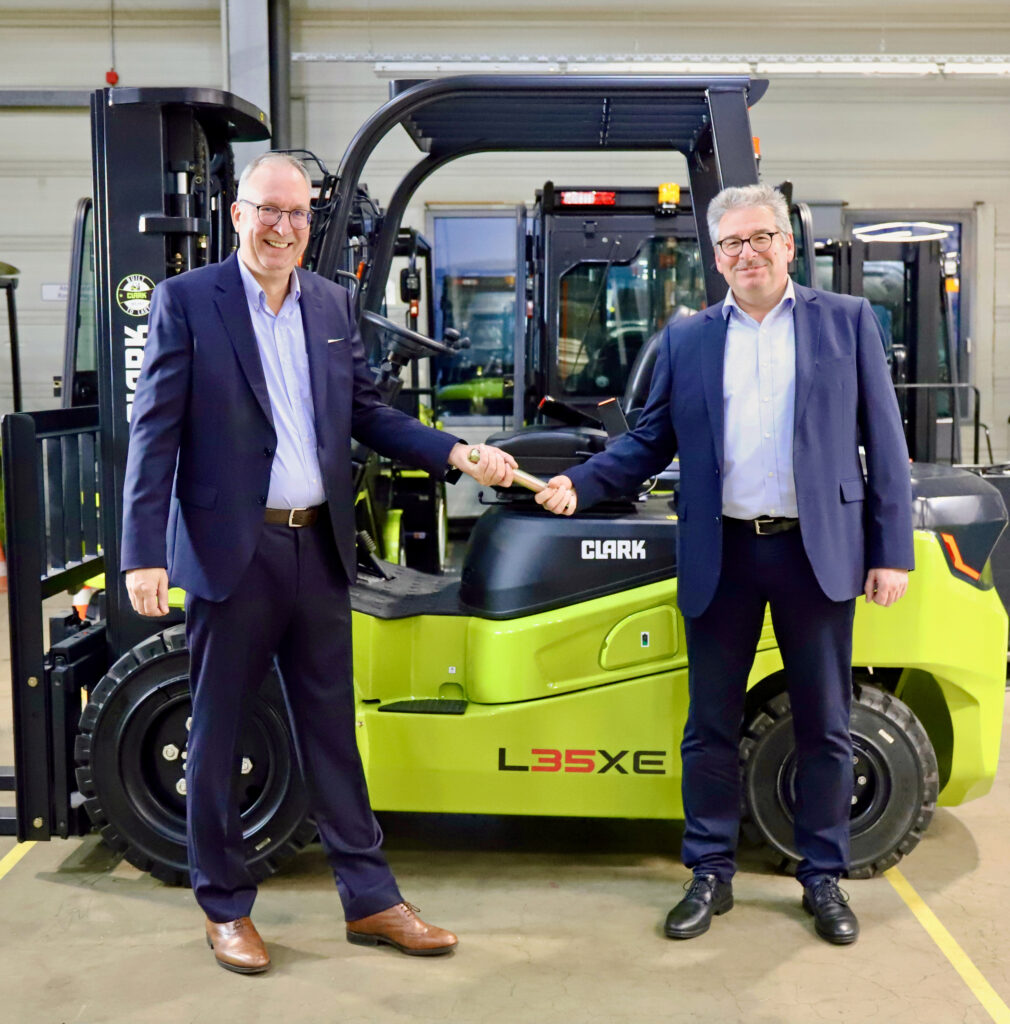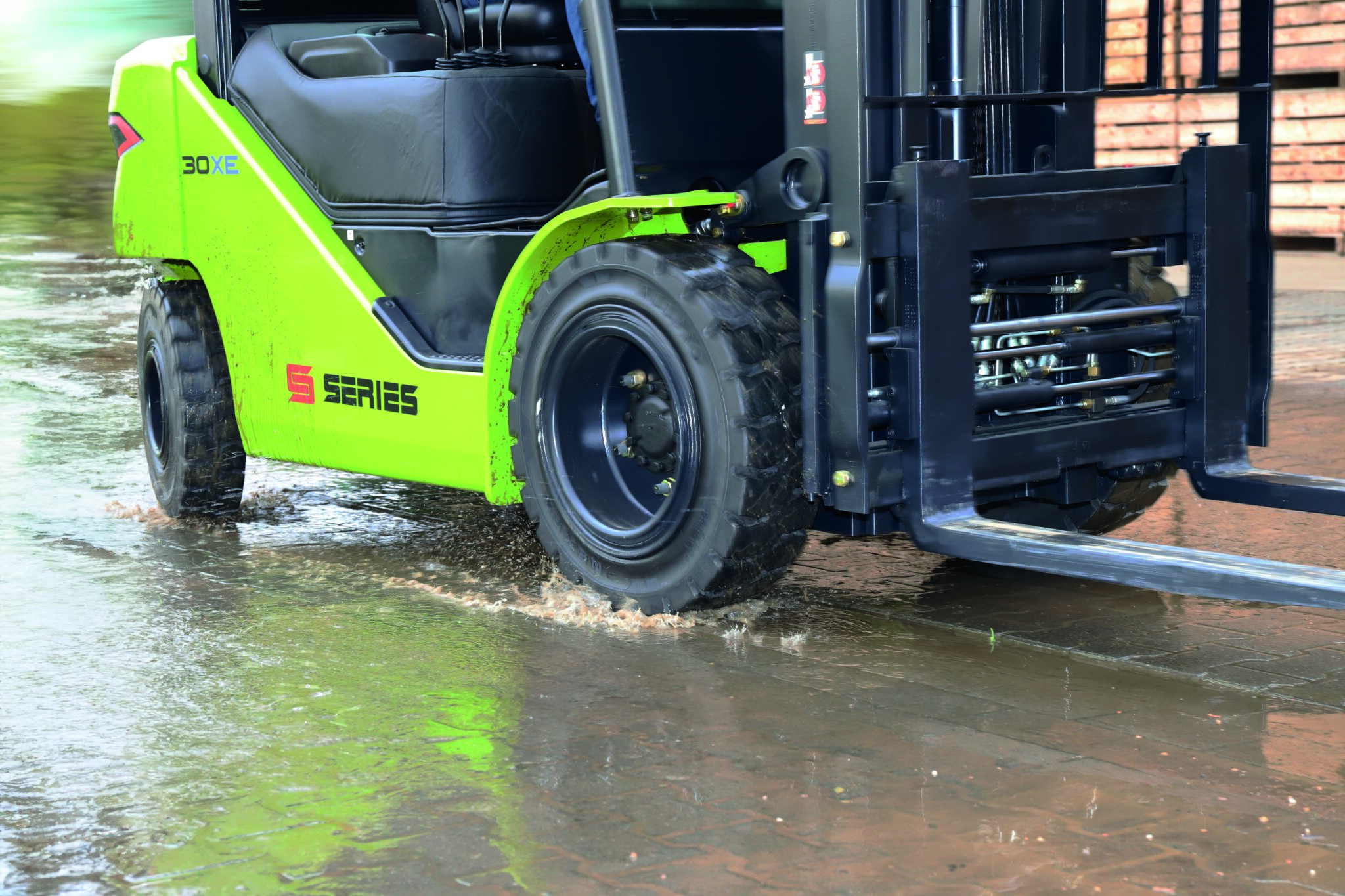From Heritage to High-Tech Forklifts
26th May 2025

In an interview with Stefan Budweit, President and CEO of Clark Europe, Peter MacLeod detects the brand shifting strategically in a more high-tech direction.
As the global materials handling sector undergoes seismic shifts – driven primarily by sustainability mandates, technological innovation, and evolving customer demands – Clark Europe is on a mission not just to keep up but to leap ahead. At the helm of this ambitious transformation is Stefan Budweit, its President and CEO, whose three-decade career spans major names like Jungheinrich, Toyota, and now, Clark, having replaced Rolf Eiten on 1st January this year. In an exclusive interview with Logistics Business, Budweit discusses the brand’s growth strategy, product innovation, and how a century-old name is reinventing itself for the electric age.
Growth-Driven Challenger
Budweit’s career journey mirrors the evolution of the industry itself. Starting in parts sales with Jungheinrich before taking on international sales roles, and later leading global key accounts at Toyota, he’s no stranger to operating at scale. “The transition to Clark was a chance to build something new,” Budweit explains. “At Jungheinrich and Toyota, you’re maintaining a large ship. At Clark, we saw the opportunity to grow from a lower base with fresh thinking. We had nothing to lose – only ground to gain.”
Now, with his promotion to CEO, Budweit is tasked with steering the next chapter in Clark’s storied history. “Taking Clark from a global ranking of around 14 or 15 to a top-10 position, that’s a task that excites me.”
Clark’s strategy isn’t about chasing every trend or copying market leaders. Instead, it focuses on aligning its products with customer needs, especially those of its core base: small to mid-sized businesses with fleets of up to 20 units. These customers, often underserved by larger OEMs, are facing the same pressures to cut carbon emissions and improve efficiency as the major logistics players.
“The role of the forklift hasn’t fundamentally changed – it still moves pallets from A to B,” says Budweit. “But the environment in which it operates has. That’s where we see opportunity.”
One of Clark’s key growth initiatives lies in its newly-announced crossover models, electric trucks designed for outdoor use, previously a stronghold of internal combustion (IC) vehicles. These rugged, high-clearance trucks can handle conditions where diesel and gas once reigned supreme, such as mud, rain, and uneven ground.
“These crossover models meet customer needs for performance and sustainability,” Budweit notes. “And because many big players don’t yet offer a comparable product, we see a real chance to carve out market share.”
Sustainability with Substance
For Clark, sustainability is a sales imperative. Across Europe, emissions regulations are accelerating the decline of IC trucks. Meanwhile, companies of all sizes face growing pressure to report on their ESG metrics.
“Even smaller customers now need to reduce their carbon footprint and report it in their annual reviews,” Budweit says. “We’re helping by providing electric alternatives and also by offering transparency in our own production and logistics emissions. ESG is now a core part of our value proposition.”
This shift is most visible in Clark’s electrification strategy. While IC trucks remain important in less regulated markets like Africa and parts of the Middle East, in Europe, electric models dominate, particularly in warehousing where electric account for around 65% of the market.
To serve this demand, Clark offers both lithium-ion and lead-acid battery options across its electric range. “Flexibility is key,” Budweit says. “Many customers start with lead-acid and upgrade later. Our trucks are designed to accommodate both.”

Another sign of Clark’s transformation is in branding. Gone are the cryptic model names, and in come the bold new product lines Raider and Renegade introduced at LogiMAT.
“The names help us position products for specific markets,” Budweit explains. “Raider is the entry-level option, cost-effective and durable. Renegade is for more demanding applications, with advanced features and premium ergonomics.”
The differentiation also allows Clark to tailor offerings across regions. While Eastern Europe may favour budget-friendly models, Scandinavia expects high-end features and comfort. With centralised product groups now coordinating global development, Clark is better equipped than ever to deliver region-specific solutions.
Going Digital
As the forklift industry evolves beyond the mechanical into the digital, Clark is embracing the shift. Its new fleet management system – developed in-house rather than outsourced – is a response to changing customer profiles and the rise of larger fleet operators.
“In the past, our customers didn’t necessarily demand fleet management,” Budweit says. “But as our client base grows to include bigger operators, we’re providing smart solutions, factory-installed, and fully integrated.”
Looking ahead, Clark sees potential in leveraging AI for predictive maintenance and safety features, particularly in real-time hazard detection. “AI is already playing a role in fleet optimisation,” Budweit says. “We’re integrating these capabilities to meet the demands of a more sophisticated user base.”
The Brand Comes Home
Founded in 1917, Clark invented the modern forklift. Today, Budweit sees that legacy as both a differentiator and an asset. “In many countries, when people say ‘forklift,’ they still say ‘Clark,’” he notes. The company is tapping into that heritage with a symbolic move: on 10th April, it officially returned its global headquarters to Dallas, Texas. “Clark is coming home,” Budweit says with a smile. “We’re reopening our US manufacturing base and reconnecting with our American roots.”
From rugged electric crossover trucks to AI-enabled fleet solutions, Clark is reimagining itself for a future that demands sustainability, flexibility, and performance. And under Budweit’s leadership, the company is not just talking about transformation, it’s building it one truck and one customer at a time. “The sky is the limit,” he concludes. Clark has no pretences to become another Toyota or Jungheinrich – it’s cornering a healthy market where a heritage brand meets future-ready thinking.

